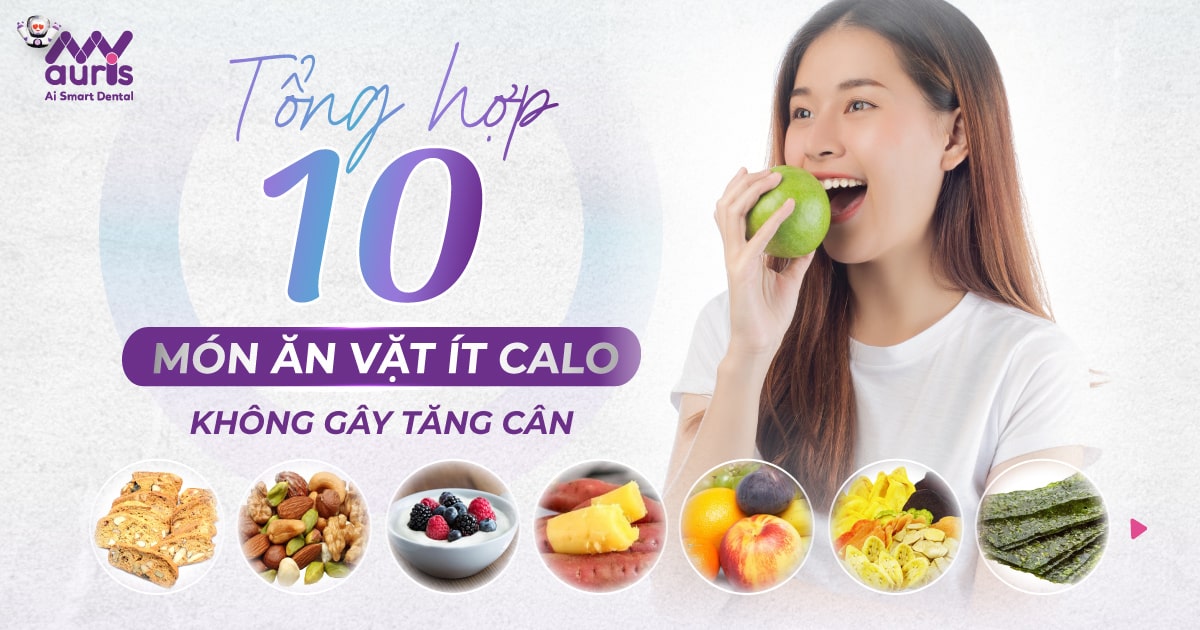During weight management, cravings are often unavoidable. However, making smart food choices will help you maintain your physique without compromising your health. Prioritize healthy, nutrient-rich, but low-calorie foods to balance your diet.
Do you love snacking but worry about your weight? How can you satisfy your cravings without affecting your weight loss regimen? Let My Auris help you discover low-calorie snacks (under 100 calories) that allow you to eat well and stay in shape!
Top 11 Low-Calorie Snacks for Effective Weight Loss
Unsweetened or Low-Sugar Yogurt
Yogurt is not only a healthy food but also provides abundant protein, calcium, B vitamins, and probiotics. 100g of unsweetened yogurt contains only 61.3 kcal, while low-sugar yogurt contains 84.8 kcal. Regularly adding yogurt to your diet helps boost digestion, supports bone and joint health, and rejuvenates the skin.

Mixed Nuts
Mixed nuts are an ideal choice for those seeking a healthy snack that is both delicious and supports weight loss. Nuts like walnuts, almonds, cashews, and roasted peanuts not only provide a source of healthy fats but are also rich in protein and fiber, helping you feel full longer and curb uncontrolled snacking.
According to nutritional studies, despite their high calorie and fat content, when consumed in proper portions, they can effectively aid in weight management. For optimal benefits, you should eat about 1/4 cup or a small handful per snack. Choosing unsalted, unseasoned mixed nuts will enhance their nutritional value and better support your weight loss journey.

Fresh Cheese
Fresh cheese is an excellent choice for those looking to maintain their figure while ensuring energy reserves. According to the United States Department of Agriculture (USDA), 100g of cheese typically provides 400 calories, containing significant fat, calcium, vitamin A, and linoleic acid. To get enough energy without worrying about excess calories, you should consume about 50g of cheese daily.

Nut Milk
Nut milk meets the nutritional needs of those on a weight loss journey due to its high content of unsaturated fats, providing protein, vitamins, and minerals. Almonds, walnuts, and soybeans are key ingredients for this healthy beverage. Drinking nut milk with diet cookies makes a perfect choice for breakfast or snacks.

Seaweed, Sea Grapes
Seaweed and sea grapes are known as “superfoods” rich in iodine, linoleic acid, and alginate – a natural fiber that aids digestion and effectively supports weight loss. Furthermore, they are beneficial for thyroid function and help reduce excess fat accumulation.
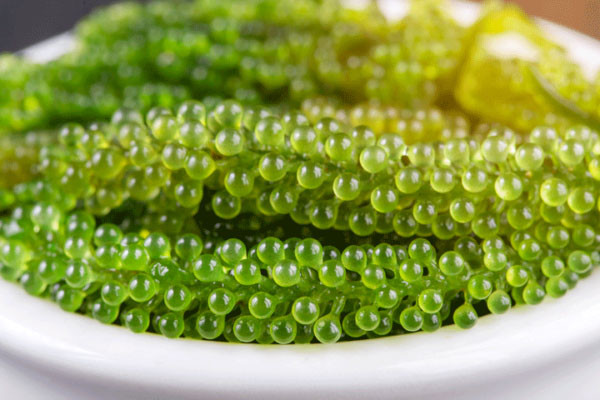
Fruits and Vegetables
Fruits and vegetables are indispensable foods in a diet. They are rich in fiber, vitamins, and minerals, helping maintain good digestion and improving fat metabolism. You can prepare fruits and vegetables as a salad mixed with yogurt, olive oil, or as dried vegetable snacks, perfect alternatives to oily snacks.

Brown Rice Flakes
Brown rice flakes or crispy brown rice are excellent choices for those looking to snack healthy while maintaining their figure. Made from 100% selected brown rice, the cooked grains are roasted until crispy, retaining their high fiber content. This helps the body feel full longer, significantly reducing the need for uncontrolled snacking, and supporting effective weight loss.

Nuts & Fruits
Fresh fruits and nuts are indispensable in a weight loss menu. Low in calories but rich in water, fiber, natural sugars, vitamins, and minerals, they keep the body energized without causing weight gain. Adding fruits daily will help you maintain radiant skin and improve your digestive system.
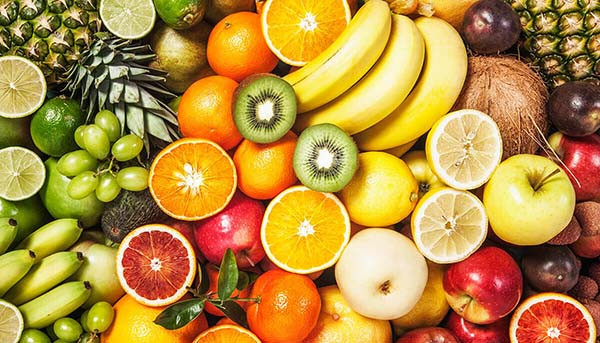
Dark Chocolate
Many studies show that pure dark chocolate is related to BMI, an index for assessing body fat. On average, one ounce of dark chocolate contains about 136 calories, is sugar-free, rich in fiber, and healthy fats. Additionally, chocolate helps improve mood, enhance memory, and effectively supports blood sugar control.
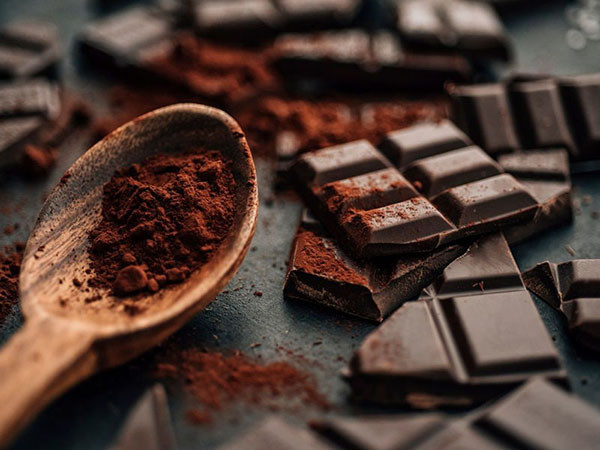
Boiled Eggs
A boiled egg (50g) provides approximately 77 calories but contains abundant protein and many essential nutrients. Adding eggs to your diet helps stabilize thyroid function, supports the process of converting lipids into energy, helping the body maintain health without worrying about weight gain.
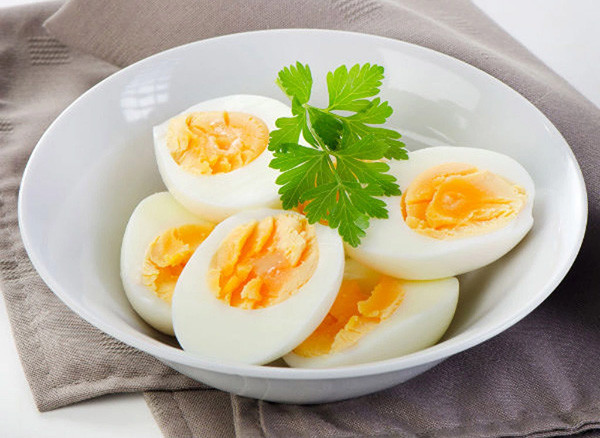
Dried Fruits
If you are too busy or do not have seasonal fresh fruit, dried fruit is an ideal solution. You can combine it with yogurt, fresh milk, diet cookies, or cereals to create a snack that is both delicious and nutritious. However, prioritize varieties with no added sugar to ensure optimal weight loss effectiveness.

Other Low-Calorie Snacks, No Worries About Gaining Weight
Looking for low-calorie snacks to manage your weight while ensuring nutrition? Here is a list of snacks that are not only delicious but also effectively support weight loss:
- Oatmeal cookies with dried fruit – 93 calories/3 pieces
- Pumpkin seeds – 90 calories/100 grams
- Almond bites – 80 calories/3 pieces
- Oatmeal waffles – 99 calories/serving
- Fresh kiwi – 68 calories/2 fruits
- Pomegranate – 63 calories/fruit
- Fresh pineapple – 40 calories/fruit
- Fresh peach – 40 calories/fruit
- Orange – 67 calories/fruit
- Mandarin orange – 70 calories/2 large fruits
- Pear – 98 calories/fruit
- Dragon fruit – 50 calories/large fruit
- Dates – 70 calories/100 grams
- Cherry tomato salad – 40 calories/serving
- Vegetable salad – 80 calories/serving
- Roasted kale – 30 calories/cup
- Sweet potato – 65 calories/medium tuber
- Roasted honey sweet potato – 96 calories/100 grams
- American corn – 62 calories/cup
- Roasted zucchini – 31 calories/fruit
- Fruit jelly – 70 calories/10 pieces
- Fruit pizza – 80 calories/slice
- Chocolate cookies – 85 calories/2 large cookies
- Banana with peanut butter – 90 calories/serving
- Diced mango mixed with yogurt – 50 calories/100 grams
- Fruit tart – 60 calories/medium tart
- Banana spinach smoothie – 70 calories/glass
- Clean-eating black bean sweet soup – 60 calories/glass
- Chia seed pudding – 60 calories/cup
- Passion fruit pudding – 60 calories/cup
- Sorbet – 90 calories/cup
- Pumpkin soup – 98 calories/cup
- Shredded chicken – 99 calories/small cup
- Mashed beans – 70 calories/serving
Benefits of Low-Calorie Snacking for Health
Stabilize Blood Sugar and Maintain Energy
Glucose serves as the primary fuel source that helps the body function effectively. When not eating enough, over-exercising, or having medical conditions like diabetes, the risk of hypoglycemia can occur, leading to fatigue, dizziness, and affecting the nervous system.
To maintain stable blood sugar levels, you should have a snack approximately 3 – 5 hours after a main meal. Healthy snacking not only provides extra energy but also reduces intense hunger pangs, helping you stay mentally alert and more focused on work and study.
Effective Weight Management
Many people worry that snacking can lead to weight gain, but in reality, this depends on how you choose healthy foods. Instead of eating uncontrollably, you should divide your portions into 3 – 5 small meals throughout the day, especially when feeling hungry or tired from working too long.
Choosing foods rich in protein, fiber, and good carbohydrates will help you maintain a healthy weight, curb excessive cravings, and support effective metabolism.
Help Control Mood and Reduce Stress
Snacking not only provides energy but also positively impacts the brain. Some carbohydrate-containing foods can stimulate the production of serotonin – a crucial neurotransmitter that helps regulate mood, control emotions, and enhance memory.
Additionally, a timely snack can help you relax, reduce stress, and improve your mood throughout the day. Choosing healthy foods offers holistic benefits for both physical and mental well-being.
Ideal Snacking Times to Maintain Energy Throughout the Day
Snacking about 1 – 2 hours before a main meal helps the body have enough energy without affecting appetite. This is especially important to avoid false satiety that might make you lose interest in the main meal.
3 – 4 hours after a main meal, most of the food has been digested, and the body needs to replenish energy to continue studying and working effectively. A snack at this time helps you maintain focus and avoid sluggishness.
- Office workers: Should snack around 3 – 4 PM to maintain productivity during the afternoon shift.
- Manual laborers: Can snack every 1.5 – 2 hours of work to replenish expended energy and hydrate, helping the body recover quickly.
Instead of snacking impulsively to satisfy cravings, you should only eat when you truly feel hungry or tired. At the same time, split your snacks throughout the day for better nutrient absorption without putting strain on the digestive system.

Scientific Snacking Tips for Effective Calorie Control
The habit of reading food labels helps you control the amount of calories, fat, sugar, and salt consumed. This allows you to choose healthy foods and avoid overeating, which leads to excess energy.
The body needs 1,500 – 2,500 calories per day to function. Choosing low-calorie snacks like yogurt and fruit snacks helps you lose weight and limit excess fat accumulation.
A scientific snacking regimen should not exceed the total calorie intake of main meals. You should control portion sizes to maintain proper nutrition without gaining weight.
Instead of emotional eating, listen to your body. Only eat when truly hungry to provide necessary energy, avoiding snacking purely out of habit or boredom.
Ideally, you should limit snacks to less than 3 times a day to control calories and avoid consuming too much unnecessary energy.
Meal planning helps you proactively control portions, choose appropriate foods, and maintain a scientific, balanced diet.
Avoid buying snacks when too hungry to prevent losing control. Have healthy food options ready, such as fruit juice, yogurt, or fruit snacks, to replenish energy appropriately.
The Impact of Snacking on Body Weight: To Snack or Not to Snack?
Snacking habits directly affect body weight, depending on whether you choose healthy or unhealthy foods. Each snack contains different nutritional components, calories, and fats, impacting weight loss or gain differently. Additionally, taste preferences, lifestyle, and absorption capacity also play crucial roles.
Snacks high in oil, seasonings (salt, sugar), or made from hard-to-digest ingredients can lead to excess fat accumulation, increasing the risk of obesity and cardiovascular diseases. In particular, continuous eating or consuming too many snacks throughout the day can negatively impact overall health.
Conversely, choosing snacks that are low in fat, low in calories, and rich in vitamins and minerals helps supplement nutrients without worrying about uncontrolled weight gain. Incorporating healthy foods into your diet not only supports weight loss but also diversifies your taste, bringing long-term health benefits.


